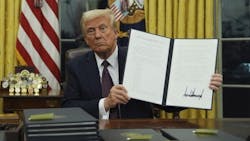Related Content:
Trump temporarily halts leasing and permitting for wind energy projects
President Donald Trump signed an executive order temporarily halting offshore wind lease sales in federal waters and pausing the issuance of approvals, permits and loans for both onshore and offshore wind projects.
By Bruce Beaubouef, Managing Editor
President Donald Trump on Monday declared a national energy emergency and ordered the US to withdraw from the Paris climate agreement, as he seeks to implement a sweeping agenda aimed at boosting production of fossil fuels.
The order was invoked under the National Emergencies Act, which gives the president emergency powers. It directs the head of federal agencies to identify any emergency authorities they may have to facilitate the production or processing of energy.
“The inflation crisis was caused by massive overspending and escalating energy prices and that is why today I will also declare a national energy emergency. We will drill, baby, drill,” Trump said during his inaugural address. The president promised during his campaign to slash energy costs in half within the first year of his administration.
Trump’s declaration directed the heads of federal agencies “to identify and exercise any lawful emergency authorities available to them” to facilitate the leasing, siting, production and generation of domestic energy sources including on federal lands.
“The national energy emergency is crucial because we are in an AI race with China, and our ability to produce domestic American energy is so crucial such that we can generate the electricity and power that’s needed to stay at the global forefront of technology,” a White House official told reporters on Monday.
Trump is abandoning the Biden administration’s domestic and international commitments to fight climate change. The US will consider its withdrawal from the Paris climate agreement to be effective as soon as the UN ambassador submits notification to the United Nations, according to the president’s executive order.
Trump also signed orders to revoke former President Joe Biden’s actions that barred oil and gas drilling in large swathes of the Arctic and in US coastal waters, a move that will likely be contested in court.
He also repealed Biden administration goals for half of all new car sales to be zero-emission vehicles by 2030, to achieve a carbon-free electricity sector by 2035, and to achieve net-zero emissions no later than 2050.
The US has been the largest producer of crude oil in the world for years, outpacing Saudi Arabia and Russia. The CEOs of Exxon and Chevron have said oil and gas production levels are based on market conditions and are unlikely to increase significantly in response to who is in the White House.
“There’s still some upside,” Chevron CEO Mike Wirth told CNBC’s Brian Sullivan in a Jan. 8 interview. “But probably not growth at the rate that we’ve seen over the last number of years as particularly some of these new shale plays begin to mature,” Wirth said.
Exxon CEO Darren Woods told CNBC in November that US shale production has not faced “external restrictions” under the Biden administration. There are areas in the Gulf of Mexico that have not opened up due to federal permitting, Woods said at the time. The Biden administration had planned the fewest oil and gas leases sales in history in a five-year program that runs through 2029.
“That could, for the longer term, open up potential sources of supply,” Woods said of increasing lease sales.
American Petroleum Institute President and CEO Mike Sommers issued the following statement in response to President Trump’s Day One executive orders to unleash American energy:
“Americans sent a clear message at the ballot box, and President Trump is answering the call on Day One—US energy dominance will drive our nation’s economic and security agenda. Directing regulators to expand access to resources, lift the LNG pause, streamline permitting processes and roll back heavy-handed vehicle mandates will help deliver a stronger, more prosperous energy future for all Americans. This is a new day for American energy, and we applaud President Trump for moving swiftly to chart a new path where U.S. oil and natural gas are embraced, not restricted.”
Check out coverage from our other Endeavor Business Media brands:
President Donald Trump propels pro-fossil fuel, oil and gas, agenda with day-one executive orders, national energy emergency declaration | Oil & Gas Journal
In his first hours in the White House, President Trump ordered the government to resume processing LNG export permits, reversed actions to close parts of Alaska and federal waters to oil and gas development, pumped the brakes on a transition to EVs, and bid adieu to the Paris climate accords.
How Trump Could Achieve Victory Over China at the Panama Canal | IndustryWeek
Experts say winning against China will likely look like Panamanian efforts to curb immigration into Central America and giving US companies as shot at port management contracts.
Trump's auto policies would reduce US production targets | IndustryWeek
Increased tariffs, emissions rollbacks and eliminating incentives will bring turmoil and instability.
Will Trump’s second term usher in golden age for trucking? | Fleet Maintenance
Relaxed regulations and an America first economic policy are a few ways the incoming president can help pull trucking from its current rut.
Maintenance mindset: Manufacturers prepare for impact of new US tariff policy | Plant Services
With a planned 25% tariff on imports from Canada and Mexico, and potential wider implementation of a 'universal tariff,' manufacturers are preparing for significant operational cost increases and strategic adjustments.
3 ways a second Trump presidency could affect building owners and operators | Buildings
Tariffs, interest rates, and changes in priorities around decarbonization and climate change could impact building owners and facility managers.
Trump and telecom: The latest developments | ISEMAG
Four quotes that highlight the flurry of talk about Trump's second term and telecom.
About the Author
Bruce Beaubouef
Managing Editor
Bruce Beaubouef is Managing Editor for Offshore magazine. In that capacity, he plans and oversees content for the magazine; writes features on technologies and trends for the magazine; writes news updates for the website; creates and moderates topical webinars; and creates videos that focus on offshore oil and gas and renewable energies. Beaubouef has been in the oil and gas trade media for 25 years, starting out as Editor of Hart’s Pipeline Digest in 1998. From there, he went on to serve as Associate Editor for Pipe Line and Gas Industry for Gulf Publishing for four years before rejoining Hart Publications as Editor of PipeLine and Gas Technology in 2003. He joined Offshore magazine as Managing Editor in 2010, at that time owned by PennWell Corp. Beaubouef earned his Ph.D. at the University of Houston in 1997, and his dissertation was published in book form by Texas A&M University Press in September 2007 as The Strategic Petroleum Reserve: U.S. Energy Security and Oil Politics, 1975-2005.

